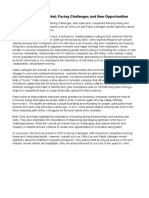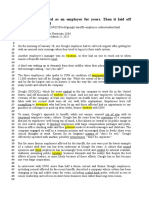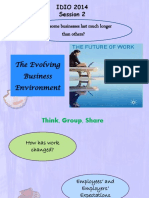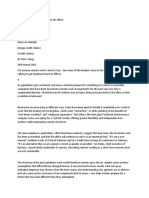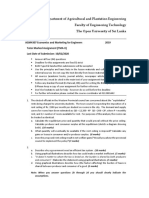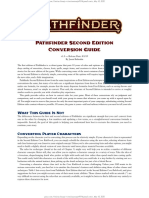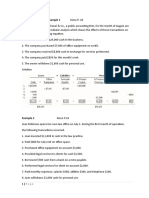Dylan Limoeiro
Jotmar Isip
Eng 130
12/01/2024
And analysis of The Era of Happy Tech Workers Is Over. By Nadia Rawlinson
Silicon Valley as we know it -- with its radically transparent company cultures,
empowered employees, flat hierarchies and rarefied perks like nap pods and free
food -- is quickly disappearing. And it's unlikely to return.[Here we can identify the
main topic of this article ]
For nearly two decades, tech companies heralded an approach that centered on
making workers happy with benefits that were intended to seamlessly integrate work
and life. [ Here we can identify the main audience with the referral to workers. They
and with the main title of this article it is already pointing to those who will be affected
] made well-being programs and unlimited vacation, initiatives that prioritized the
whole person, standard employee benefits. This, along with high salaries and equity
packages, was a way not just to win but also to dominate the war for talent. The
rapid growth and success of Silicon Valley companies, driven in part by their unique
people practices, reimagined workplace culture for a generation.
Times, as they say, are a-changin'. The industry is facing an uneven macroeconomic
environment and a roiling stock market that is putting pressure on public tech
companies and making for a less-than-ideal I.P.O. environment for private ones.
Tech chief executives are now optimizing more for profitability than for growth at all
costs, sometimes at the expense of long-held organizational beliefs. [ The topic and
purpose of this article can be seen here with its purpose to explore on how “ These
times are changing” ]
The shift is most evident in the recent surge of tech layoffs. There has been lots of
public discussion about the disruptive axing of half of Twitter's 7,500 employees, a
move conducted under its new owner, Elon Musk. Haphazard and rolling, the layoffs
were painful to watch. The employees who remained have had to endure greater
workloads on significantly smaller teams. But while outsiders may have viewed these
layoffs as impulsive, they seemed to have primed the environment for other tech
companies to follow. In 2022, the tech industry laid off over 150,000 people. In the
first few weeks of 2023 [ cultural context of the text can be viewed here with both the
time being shown and figures such as Elon Musk being represented here ], Microsoft
announced 10,000 job cuts and Alphabet followed with 12,000.
According to multiple media outlets, Meta and Amazon use stack ranking for their
employees [ Cultural context with the referral of meta and amazon ], a controversial
�approach in evaluating talent. Popularized by G.E. in the 1980s (though the
company later abandoned it), the process has managers rate their employees on a
forced curve. Generally, only 20 percent are deemed top talent, and 10 to 15 percent
must be designated as low performers. Although there are benefits, even in the best
of times, the practice can create a competitive work environment that de-emphasizes
employee improvement. With impending layoffs, people with the lowest ranking are
typically the first to go.
The layoffs are part of a new age of bossism [Cultural context and topic can be one
again be seen here with the hole reading being an informative analysis on why and
how this era in coming to an end plus a detail on what may has spur this new found
era ] , the notion that management has given up too much control and must wrest it
back from employees. After two decades of fighting for talent, chief executives are
using this period to adjust for years of management indulgence that left them with a
generation of entitled workers.
In 2012, to spur innovation and drive engagement, LinkedIn began the incubator
program. A perk that encouraged employees to come up with approved ideas that
they could work on full time for up to three months was generous even by Silicon
Valley standards. Then there were the many lavish events that served to put a
company's culture on display. It was par for the course for employees to attend
elaborately themed holiday parties featuring the next new Instagrammable
experience. If you happened to work at Uber in 2015 and attended its corporate
event in Las Vegas, you were treated to a private performance from Beyoncé.
Executives across industries are leaning into their newfound bossism and ending
pandemic-era work arrangements and incentives. Reed Hastings, Netflix's co-
founder and co-C.E.O., said near the start of the pandemic that he didn't ''see any
positives'' in working from home, and the company apparently allows only some
remote work. TikTok reportedly told employees that it was sunsetting gym
membership and Wi-Fi reimbursements as well as its $45 daily meal stipends to
workers not tied to the company's main hubs, in its own efforts at restraint. These
changes are bellwethers.
Not all tech employees see these shifts as signals. I recently spoke with a product
marketing manager from Meta who was laid off. I assumed that she would be
apprehensive about her job prospects; instead, armed with three months' severance
and decent savings, she remains optimistic. With nearly 79 percent of software
engineers and nearly 76 percent of marketers who were laid off in tech finding jobs
within three months, her optimism isn't necessarily unfounded.
However, a few things are true now that make the shift in tech employee culture not
just a moment in time but also a redefinition of how tech companies will be run.
Meta and Salesforce combined lost more than $700 billion in market cap last year.
Both companies are now dealing with activist investors who have taken prominent
�positions in their stocks. The activists have called for the companies to slash costs,
reduce nonstrategic investments and, notably in Meta's case, aggressively reduce its
work force. Managers have less capacity to overhire and invest in employee
initiatives that aren't tied directly to business execution.
For tech start-ups and founder-C.E.O.s, the past 10 years were a bull run. Interest
rates were low, venture funding seemed limitless and valuations skyrocketed. With
money being essentially free, founder-C.E.O.s dived in -- pursuing revenue,
increasing their customer bases and investing in myriad people and projects.
However, with recent interest rates the highest they have been since late 2007 and
continuing market uncertainty, investors are considering more investments in
companies with strong fundamentals and cash flows. For founder-C.E.O.s, this
means it will be harder to raise funding, and investors will have an even greater
expectation of return on their money. For large tech companies and start-ups alike,
cash is no longer free, and employee investments must pay off.
We are entering an era of external investor pressure, higher financing hurdles and
overall market volatility. This environment calls for management to make structural
changes in the way workplace culture is experienced for both labor and capital.
The current tech work force is used to every voice getting a vote, and it will now have
to yield to a new world -- one with heightened expectations and disciplined
investment. Not considering the winds of change will put the careers of many
empowered workers at risk





